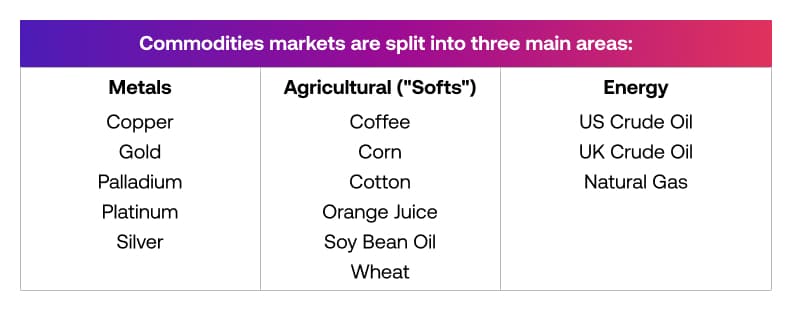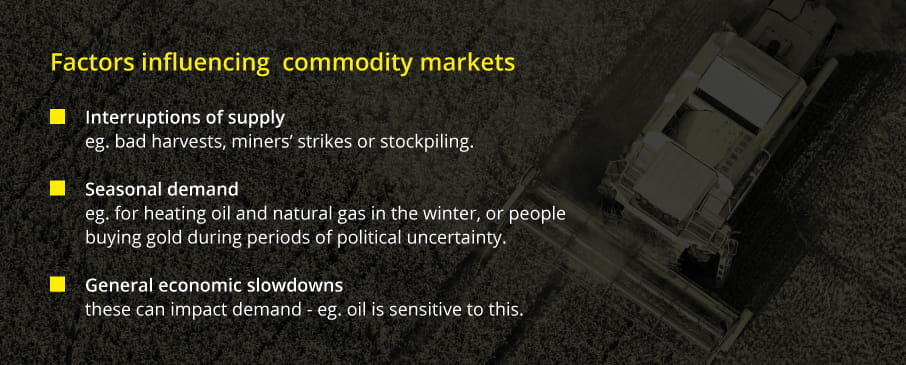
Introduction to financial markets
Trading commodities
Commodities are natural products that are generally consumed by people, animals or industry such as oil, sugar and wheat. Commodities have been traded for thousands of years and have always had an important economic impact on people and nations throughout history.
Commodity trading is just as important today, with commodities playing a crucial role in global economics. Commodity markets can be easier to understand than other financial markets because prices are influenced by more obvious contributing factors. They reflect the fortunes of industries like the oil business or farming. Prices are informed by supply and demand issues that are easy to grasp.
The majority of commodities traded today can be split into three main areas:

Energy
Energy commodities are pumped out of the ground. They have a particularly strong influence over the global economy, and are also in turn influenced by demand from the global economy. Examples include:
- US Crude Oil
- UK Crude Oil
- Natural Gas
Agricultural - ‘Soft commodities’
Soft commodities are generally agricultural commodities that are grown or bred for human consumption, as opposed to commodities that are mined. Soft commodities are important in futures markets where people speculate on price fluctuations as supply and demand changes. They are also used by the farmers who produce these commodities to lock in the future price of their produce, and by commercial consumers and resellers of these goods. Examples of soft commodities include:
- Coffee
- Corn
- Cotton
- Orange Juice
- Soy Bean Oil
- Wheat
Metals - ‘Hard commodities’
Hard commodities are resources that are generally extracted through mining, specifically metals. Metals that are traded can either be precious metals such as gold, silver or platinum, or industrial metals such as aluminium, lead or copper. Examples of hard commodities include:
- Copper
- Gold
- Palladium
- Platinum
- Silver
How are commodities traded?
Commodity trading often takes place on exchanges as futures and options. Exchanges usually become hubs for a few commodities that it specialises in, for example:
- Chicago Board of Trade (CBOT)
Commodities that trade on CBOT include gold, corn, silver, wheat and rice - Chicago Mercantile Exchange (CME)
Commodities that trade on the CME include milk, cattle, pork bellies and lean hogs - NYMEX
known for being the most liquid market place for the trading of West Texas Intermediate Oil futures.
What drives commodity markets?

Commodity markets exist to provide more efficient prices and security for consumers of those commodities. Airlines, for example, want to be able to protect themselves from sudden and unpredictable changes in the oil price, while farmers will be looking for the best price for their products. A food manufacturer will want to ensure that the price it pays for wheat will be steadily consistent.
The growth of interest in commodity trading represents the growth in interest in global trade and delivering an internationally-recognised price for a product.
Commodity markets can be influenced by a range of factors, including:
- Interruptions of supply, such as bad harvests, miners’ strikes or stockpiling
- Seasonal demand, for example from consumers of heating oil and natural gas in the winter, or people buying gold during periods of political uncertainty
- General economic slowdowns, which can impact demand. Oil, for example, is sensitive to this
- It is worth doing more research on a market you are interested in, as each has its own characteristics
Did you know? There are two oil commodity markets, Brent Crude and West Texas Intermediate. These reflect the prices of US and non-US oil. To make things simpler, at City Index we call them US Crude Oil and UK Crude Oil. While the prices of both will be similar, they are not exactly the same.
Trading commodities with City Index
- City Index offers CFD trading on a wide range of global commodities
- You can trade over 25 energy, agricultural and metal commodities, as well as multiple futures for the same market and options for a select number of commodities






